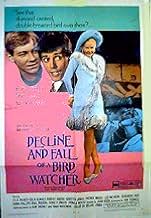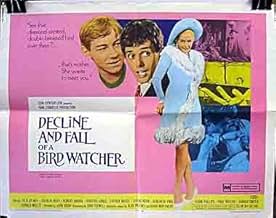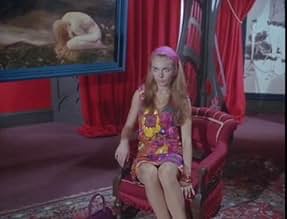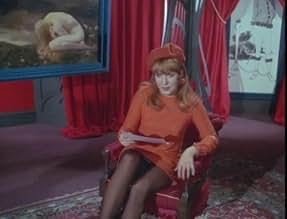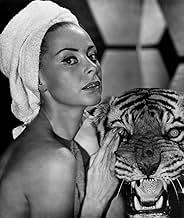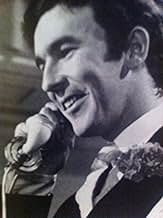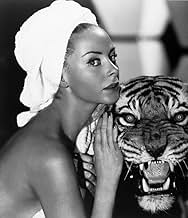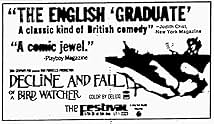Agrega una trama en tu idiomaA naive young man, sent down from university, blunders through a series of bizarre adventures in which his participation is always innocent, although others don't think so.A naive young man, sent down from university, blunders through a series of bizarre adventures in which his participation is always innocent, although others don't think so.A naive young man, sent down from university, blunders through a series of bizarre adventures in which his participation is always innocent, although others don't think so.
- Dirección
- Guionistas
- Elenco
Geneviève Page
- Margot Beste-Chetwynde
- (as Genevieve Page)
Opiniones destacadas
10stern409
It was the sixties-you have to embrace that-perfect example of the creative kinkiness that pervaded that era. The set production is beyond and captures what was cool back then- that house is so cool- the green Rolls coming into the house was a hoot-the actors are spot on -it is a pure joy to watch them frolic through this movie.
I'm sad the other reviewers don't get it- it is an important piece of history that gives an insight into the times- much the same way ' Duffy' does. I pity reviewers who judge it from a current perspective - they are totally lost.
The sixties was a brief 1966-69 trip-this was 1968 and the reality was this sideways way of life was permanent-the movie just revels in it. See it.
I'd missed this when it was given a U.S. theatrical release and, considering its cast, thought I'd give it a whirl when it was shown today on the FOX Movie Channel. But, as it unreeled, the recollection of its lukewarm-to-poor reviews came vividly to mind. It's a thorough disappointment in lots of ways, beginning with a script that has barely a hint of what was, no doubt, a good example of novelist Evelyn Waugh's acerbic social satire. The production design, typical of most films then, British and American, is colorfully garish. And the waste of the acting talent of a phalanx of the best British character actors is awesomely prodigious, attributable, I'm sure, to the slack direction of one John Krish, whose meager filmography is testament to his utter mediocrity. I should have been forewarned by the psychedelic colors swirling under the main credits (Well, the year of production WAS 1968, after all.) and the soupy music of Ron Goodwin, whose syrupy strains inappropriately underline most of the film's unfolding. Worst of all was the misuse of the elegant Genevieve Page, an actress perfectly capable of playing a lady of privilege and breeding, who seems, in this one, to be an inexperienced amateur attempting a role for which she is almost entirely unsuited. What a pity!
When choosing to adapt this film, why would you throw away many of the gifts (easy wins, five-yard tap-ins, call them what you will) that Waugh's novel offers the film-maker? The dialogue sparkles on the page, and the set pieces come thick and fast, but the film misses much of the good stuff out, particularly early on in the action, or simply botches it. Waugh's characters also offer plenty of scope for effective adaptation to the screen, but the film makes a rather mushy attempt at most of the character portrayals too, despite the efforts of a strong cast.
Waugh's biting humour is dulled and debased from the start, reaching almost "Carry on"-like levels of simplicity. Paul is spuriously turned into a birdwatcher for about four seconds at the start of the action for the purpose of making smutty hints at a sex comedy that the film doesn't deliver (see also the publicity posters). The potential for sexual transgression that shimmers under the surface of Waugh's writing is also botched; the film spells it out rather demurely (this was the 1960s, when censorship was still very strict), while aiming desperately for superficial titillation.
There are so many simply baffling choices in terms of character and action that it's hard to know where to start. That's not to say a film can't be successful if it doesn't stick close to the source - of course it can, but it has to add something new or interesting or unusual, or stand on its own two feet as a piece of art. This extraordinary effort does none of these things.
The film is almost rescued by some of the settings (but not the ludicrous prison, with its gurning, overacting warders), by the luminous Genevieve Page, and by the occasional neat touch. But surely it's time for somebody like Stephen Fry to show (again) how a Waugh adaptation should be done? A film to watch for Waugh completists only,I'm afraid. Just shield your eyes from the worst of the butchery.
Waugh's biting humour is dulled and debased from the start, reaching almost "Carry on"-like levels of simplicity. Paul is spuriously turned into a birdwatcher for about four seconds at the start of the action for the purpose of making smutty hints at a sex comedy that the film doesn't deliver (see also the publicity posters). The potential for sexual transgression that shimmers under the surface of Waugh's writing is also botched; the film spells it out rather demurely (this was the 1960s, when censorship was still very strict), while aiming desperately for superficial titillation.
There are so many simply baffling choices in terms of character and action that it's hard to know where to start. That's not to say a film can't be successful if it doesn't stick close to the source - of course it can, but it has to add something new or interesting or unusual, or stand on its own two feet as a piece of art. This extraordinary effort does none of these things.
The film is almost rescued by some of the settings (but not the ludicrous prison, with its gurning, overacting warders), by the luminous Genevieve Page, and by the occasional neat touch. But surely it's time for somebody like Stephen Fry to show (again) how a Waugh adaptation should be done? A film to watch for Waugh completists only,I'm afraid. Just shield your eyes from the worst of the butchery.
The episodic nature of Evelyn Waugh's comic novelettes don't translate well to film, and with Decline and Fall the filmmakers were dealing with a property much less biting than The Loved One. The result is a film that starts off well but (like Waugh's original story) runs out of steam a third of the way in. A terrific cast, led by Donald Wolfit, Leo McKern, and especially Colin Blakely as the recidivist butler Philbrick do their best to rescue the material.
I saw this when it came out in 1968 in London and decided it was time to see it again. Much of its humour has faded because things have changed so much, and much of it was also over-rated at the time, I can now see. The primary attraction of the film today is the marvellous performance by the incomparable Genevieve Page, whose magic was best seen in YOUNGBLOOD HAWKE (1964, see my review). This film is based on a novel by Evelyn Waugh, whose wit has faded with the wallpaper with every passing year. We are no longer so interested in making fun of the English aristocracy, as they have faded even faster than the wallpaper, so that one rarely thinks about them anymore. (They were eradicated by the hundreds of 'life peers' created by politicians, who have so diluted the prestige of being titled that a title is now more likely to raise a laugh than an eyebrow.) I remember the reaction to this film upon its release. Everyone was impressed by Genevieve Page having her Rolls Royce painted in a succession of different colours to match her gowns. In the film, the car progresses from pink to blue to green to grey, or did I get the sequence wrong? Then at the premiere I seem to recall that she turned up in a pastel-shaded Rolls Royce. The premiere was at that big cinema on Lower Regent Street which I believe may have been called the Paramount at that time. I believe I was there, or perhaps I was merely told about it by John Krish afterwards. I knew him for a while. He was the director. If I wasn't at the premiere, then I certainly saw the film in its first few days in that cinema. It was not a commercial success, I believe, and that hurt Krish's career. I always thought that Krish was under-rated, but in the case of this film, I now see that the film was justly criticised. The screenplay by Ivan Foxwell had to be souped up by Alan Hackney and Hugh Whitemore with additional scenes, but their soup was still too thin. Upon reflection, it was probably a bad idea to try to make a film based on Waugh's flimsy material in the first place. There was too much froth and too little substance, and the wildly brazen art direction of the film hurt rather than helped. Robin Phillips was chosen to be the young innocent lad around whom all the events revolve, but although he was a good choice for the part in terms of his looks and personality, he had no screen charisma at all. This was his first feature film, and within four years he had retired from films. The film offers opportunities for many character actors to take off into the outer space of acting, none more so than Colin Blakeley, who goes completely wild. Then there are Felix Aylmer, Donald Wolfit, and others. The best of them all is Leo McKern, who delivers a heart-felt performance of such pathos and poignancy that it ranks amongst the best of his filmed work. McKern always had far more in him than his appearance suggested or his casting history acknowledged. I shall never forget his amazing bravura performance as Peer Gynt in Ibsen's play at the Old Vic in the summer of 1963. If he had been a better looking man, he could have been one of the grand old men of the English stage and played all the major Shakespearian roles. My wife and I often used to eat biryanis in the Shahbag on Haverstock Hill at the same time as Leo McKern, who haunted the place as we did, and who seemed to like sweating on the hotter dishes such as Vindaloo or Madras curries. He had the most amazingly rough complexion but was very jolly and nice and interesting. Krish lived nearby in the Vale of Health and was a very pleasant and fascinating man to talk to. That was back in the days when everybody seemed to be in Hampstead. Nowadays nobody is in Hampstead except for spoilt rich people who have nothing to say and who never read a book unless it is an airport novel on a beach somewhere, in between keeping an eye on their share prices. I fear that the targets of satire these days have shifted, and nobody cares anymore whether lord and lady so-and-so are eccentric. That is all over.
¿Sabías que…?
- TriviaEvelyn Waugh's original novel is simply called "Decline And Fall". It was reported at the time, in all seriousness, that the title had been altered for this film in case people thought it was some sort of Roman historical epic.
- Créditos curiososActor John Trenaman is credited as 'John Trenaman' in opening title, as 'John Treneman' in ending title.
- ConexionesReferenced in Volar es para los pájaros (1970)
- Bandas sonorasMen of Harlech
(uncredited)
Traditional
Selecciones populares
Inicia sesión para calificar y agrega a la lista de videos para obtener recomendaciones personalizadas
Detalles
- Fecha de lanzamiento
- País de origen
- Idioma
- También se conoce como
- Düşüş
- Locaciones de filmación
- St. Pancras Renaissance Hotel London, Euston Road, London, Greater London, Inglaterra, Reino Unido(interior, as Llanabba Castle)
- Productora
- Ver más créditos de la compañía en IMDbPro
- Tiempo de ejecución1 hora 53 minutos
- Color
- Relación de aspecto
- 1.85 : 1
Contribuir a esta página
Sugiere una edición o agrega el contenido que falta

Principales brechas de datos
By what name was Decline and Fall... of a Birdwatcher (1968) officially released in Canada in English?
Responda
